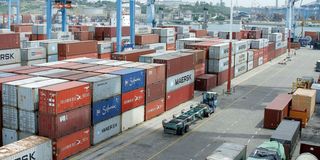
Cargo containers at the Port of Mombasa in September last year.
The appeals court has cleared the way for Kenya Ports Authority to license another grain handler at the Port of Mombasa.
Court of Appeal judges Pauline Nyamweya, Imaana Laibuta and George Odunga found that the High Court erred in stopping KPA from awarding Portside Freight Terminals the deal for building a second facility at the port.
The three judges said awarding the contract to Portside was not discriminatory and that the KPA and the Treasury did not breach the Constitution in tapping the firm.
Grain Bulk Handlers Ltd (GBHL) is the main player in the handling of bulk grains.
“In view of the foregoing, we find merit in this appeal and hereby set aside the judgment and decree of the High Court of Kenya at Mombasa delivered on July 18, 2023,” said Justices Nyamweya, Laibuta and Odunga in Friday’s judgment.
In July, Justice John Onyiego quashed a decision by Treasury Cabinet secretary Njuguna Ndung’u allowing KPA to award Portside Freight Terminals Ltd the deal to build a second grain bulk handling facility through a special tender or Specially Permitted Procurement.
He pointed out that the special tender was unconstitutional and discriminated against other firms interested in the second grain bulk handling deal.
Strategic partnerships
Under the special procurement, State firms with approval from the Treasury are allowed to restrict tendering if open procurement delivers undesired economic outcomes or if there is a pursuit of strategic partnerships or credit financing purchase.
Justice Onyiego also declared that the KPA board of directors acted beyond its legal powers (ultra vires) and without authority in undertaking the procurement process, arguing it remained the mandate of the managing director.
The judge faulted the KPA for amending its master plan to accommodate Portside, arguing that the blueprint demanded the second grain bulk facility to be built in Lamu or Dongo Kundu, Mombasa.
Portside intended to build its $45 million (Sh6.4 billion) facility in its private land adjacent to the port and only required the right to put up a 450-metre conveyor belt over the KPA land connecting ships to its grain handling plant.
But the Court of Appeal judges dismissed Justice Onyiego, arguing that he erred in law in stopping Portside from building the second grain handler.
“There was no evidence to show that the fourth to ninth respondents were discriminated against and, in the absence of specific pleading that the public or the first respondent was discriminated against, the learned Judge erred in finding that there was a violation of the right against non-discrimination,” said the Court of Appeal judges.
“The trial court erred in holding that the invocation of the Specially Permitted Procurement under section 144A of the PPAD, 2015 violated the Constitution.”
The fourth to ninth respondents are firms that initially expressed interest in building grain handling facilities, including Kilindini terminals, Kapa Oil refineries, Africa Ports and Terminals, Multiship International and Kipevu Inland Container EPZ Ltd.
However, the firms did not participate in the suit despite being cited as interested parties.
The judges heard that KPA would gain Sh6.9 billion from the Portside partnership in seven years, arguing that it was a better deal than investing Sh6 billion in the facility and waiting 11 years to recoup its investments.
“The trial court erred in holding that the KPA board of directors initiated the procurement in flagrant violation of the Public Procurement and Asset Disposal Act, 2015,” said the court of appeal judges, adding that there was no evidence the board initiated procurement, but guided management through the process.
They added that it was not illegal to change the location of the second grain handler from Lamu or Dongo Kundu.
Kenya imports most of its grains, such as maize, rice and wheat, in bulk, making it a lucrative business that averages 3.4 million tonnes of grains annually from more than 100 ships.
Editor's note:
The story has been updated to show that Grain Bulk Handlers was not a party to the suit.







